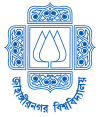
Dr. Sohel Ahmed Professor, Department of Biochemistry & Molecular Biology
PROFILE
SHORT BIOGRAPHY
Dr. Sohel Ahmed joined the Dept. of Biochemistry and Molecular Biology at Jahangirnagar University on October 29, 2006, and has been serving as a Professor since April 20, 2013. As the Manager of a HEQEP Sub-Project funded by the World Bank (Grant Amount 347.00 Lakh BDT) Prof. Ahmed has successfully established a world-class Laboratory for research in Biomedical Sciences in the Dept. of Biochemistry and Molecular Biology. He graduated from the University of Dhaka with B. Sc (Hons.) and M. Sc. (Thesis) in Biochemistry. Prof. Ahmed completed his SSC and HSC from Rajshahi Cadet College, Rajshahi. Earlier he worked in the Research Division of BIRDEM Hospital in the Depts. of Microbiology and Immunology from March 1996 to April 2004. In 1999, Prof. Ahmed was awarded the Japanese Government Scholarship to pursue his higher studies in the Dept. of Molecular Genetics at the Institute of Development, Aging and Cancer (IDAC), Graduate School of Medicine, Tohoku University, Sendai, Japan and received Ph. D. in Medical Sciences in 2004. He then worked as a post-doctoral researcher in the Health Sciences Division at the National Institute for Environmental Studies (NIES), Tsukuba, Japan till March 2006.
Prof. Ahmed served in different administrative positions at Jahangirngar University. He served as the Proctor from 2012 to 2013, as the Provost of Shaheed Rafique-Jabbar Hall from 2018 to 2022, and as Chairman of the Dept. of Biochemistry and Molecular Biology from 2009 to 2012.
Prof. Ahmed has a strong affiliation with many professional bodies. Currently, he is an Academic Council Member of the Bangladesh Open University nominated by the Hon'ble President & Chancellor. He also serves as a Selection Committee Member at Jashore University of Science and Technology (JUST) and Sheikh Hasina National Institute of Youth Development (SHNIYD) for faculty and officer recruitment. Professor Ahmed is a Member of COVID-19 and Dengue Observation and Control Cells at Jahangirnagar University. He is also a Visiting Consultant & Team Leader (COVID-19 Front-liner) of Mol. Diagnostics Laboratory at EMCH. He served as an Executive member of the Bangladesh Medical Research Council (BMRC) from 2019 to 2022. He served as an elected Treasurer of the Graduate Biochemists Association (GBA). Currently, Prof. Ahmed is the Vice-President of the Dhaka University Biochemistry and Molecular Biology Alumni Association (DUBMBAA).
Prof. Ahmed has published a total of 45 original research articles in reputed National and International Journals including Toxicology, Neurotoxicology, Pharmacology and Toxicology, Neuroimmunology, FEBS Journal, JBC, and many others. He has attended a number of conferences/seminars held in Yokohama (Japan), Colombo (Sri Lanka), Tarragona (Spain), Shenzhen (China), Kobe (Japan), Singapore City (Singapore), and New Delhi (India).
RESEARCH INTEREST
Current research includes identification of possible genetic risk factors in COVID-19 severity, cardiovascular diseases (CVDs), type 2 diabetes mellitus (T2DM) and adverse drug reactions (ADRs)
JOURNAL PAPER
Jamiruddin R, Haq A, Khondoker MU, Ali T, Ahmed F Md, Khandker SS, Jawad I, Hossain R, Ahmed S, Rahman SR, Mustafi M, Kaitsuka T, Mie M, Tomizawa K, Kobatake E, Haque M, Adnan N., Antibody response to the first dose of AZD1222 vaccine in COVID-19 convalescent and uninfected individuals in Bangladesh., Expert Rev. Vaccines, 20, 12, pp.1651-1660, 2021. doi: 10.1080/14760584.2021.1977630Abstract
Background: Vaccination with the Oxford-AstraZeneca COVID-19 vaccine (AZD1222) initially started in the UK and quickly implemented around the Globe, including Bangladesh. Up to date, more than nine million doses administrated to the Bangladeshi public.
Method: Herein, we studied the antibody response to the first dose of AZD1222 in 86 Bangladeshi individuals using in-house ELISA kits. Study subjects were categorized into two groups, convalescent and uninfected, based on prior infection history and SARS-CoV-2 nucleocapsid-IgG profiles.
Results: All the convalescent individuals presented elevated spike-1-IgG compared to 90% of uninfected ones after the first dose. Day >28 post-vaccination, the convalescent group showed six times higher antibody titer than the uninfected ones. The most elevated antibody titers for the former and later group were found at Day 14 and Days >28 post-vaccination, respectively. The spike-1-IgA titer showed a similar pattern as spike-1-IgG, although in a low-titer. In contrast, the IgM titer did not show any significant change in either group.
Conclusion: High antibody titer in the convalescent group, signify the importance of the first dose among the uninfected group. This study advocates the integration of antibody tests in vaccination programs in the healthcare system for maximizing benefit.
Keywords: AZD1222; COVID-19; IgA; IgG; IgM; SARS-COV-2; convalescence; seroconversion.
Contact
Dr. Sohel Ahmed
Professor
Department of Biochemistry & Molecular Biology
Jahangirnagar University, Savar, Dhaka-1342, Bangladesh.
Cell Phone: +8801706585499
Work Phone: +8801706585499
Email: drsahmed_bmbju@juniv.edu
, drsahmedbmbju@gmail.com

